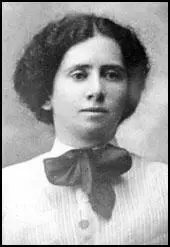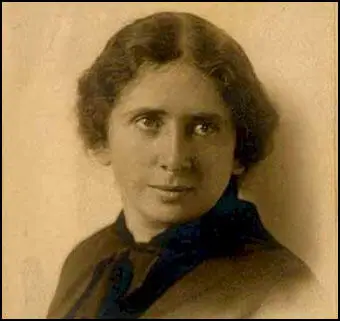Rose Schneiderman

Rose Schneiderman, the daughter of Jewish parents, was born in Saven, Poland on 6th April 1882. When Rose was eight years old her family emigrated to the United States. After the death of her father, Rose and her brothers and sisters were brought up in various orphanages.
At thirteen Rose was forced to go out to work: "I got a place in Hearn's as cash girl, and after working there three weeks changed to Ridley's, where I remained for two and a half years. I finally left because the pay was so very poor and there did not seem to be any chance of advancement, and a friend told me that I could do better making caps."
She eventually went to work in a factory in search of higher wages: "After I had been working as a cap maker for three years it began to dawn on me that we girls needed an organization. The men had organized already, and had gained some advantages, but the bosses had lost nothing, as they took it out on us. Finally Miss Brout and I and another girl went to the National Board of United Cloth Hat and Cap Makers when it was in session, and asked-them to organize the girls. Then came a big strike. About 100 girls went out. The result was a victory, which netted us - I mean the girls - $2 increase in our wages on the average."

Rose developed radical political views and became an active socialist and trade unionist. She also joined the campaign for women's suffrage. In 1903 she founded the Jewish Socialist United Cloth Hat and Cap Makers' Union. This was the start of a long career in which she eventually became president of the Women's Trade Union League.
Rose Schneiderman died on 11th August 1972.
Primary Sources
(1) Rose Schneiderman, A Cap Maker's Story, The Independent (April 1905)
When the other children were sent away mother was able to send me back to school, and I stayed in this school (Houston Street Grammar) till I had reached the Sixth Grammar Grade.
Then I had to leave in order to help support the family. I got a place in Hearn's as cash girl, and after working there three weeks changed to Ridley's, where I remained for two and a half years. I finally left because the pay was so very poor and there did not seem to be any chance of advancement, and a friend told me that I could do better making caps.
So I got a place in the factory of Hein & Fox. The hours were from 8 a.m. to 6 p.m., and we made all sorts of linings - or, rather, we stitched in the linings - golf caps, yachting caps, etc. It was piece work, and we received from three and a half cents to 10 cents a dozen, according to the different grades. By working hard we could make an average of about $5 a week. We would have made more but had to provide our own machines, which cost us $45, we paying for them on the installment plan. We paid $5 down and $1 a month after that.
I learned the business in about two months, and then made as much as the others, and was consequently doing quite well when the factory burned down, destroying all our machines - 150 of them. This was very hard on the girls who had paid for their machines. It was not so bad for me, as I had only paid a little of what I owed.
(2) Rose Schneiderman, A Cap Maker's Story, The Independent (April 1905)
After I had been working as a cap maker for three years it began to dawn on me that we girls needed an organization. The men had organized already, and had gained some advantages, but the bosses had lost nothing, as they took it out on us.
Finally Miss Brout and I and another girl went to the National Board of United Cloth Hat and Cap Makers when it was in session, and asked-them to organize the girls
Then came a big strike. About 100 girls went out. The result was a victory, which netted us - I mean the girls - $2 increase in our wages on the average.
All the time our union was progressing very nicely. There were lectures to make us understand what trades unionism is and our real position in the labor movement. I read upon the subject and grew more and more interested, and after a time I became a member of the National Board, and had duties and responsibilities that kept me busy after my day's work was done.
But all was not lovely by any means. Soon notices were hung in the various shops: "After the 26th of December, 1904, this shop will be run on the open shop system, the bosses having the right to engage and discharge employees as they see fit, whether the latter are union or nonunion."
Of course, we knew that this meant an attack on the union. The bosses intended gradually to get rid of us, employing in our place child labor and raw immigrant girls who would work for next to nothing.
Our people were very restive, saying that they could not sit under that notice, and that if the National Board did not call them out soon they would go out of themselves.
At last word was sent out, and at 2:30 o'clock all the workers stopped, and, laying down their scissors and other tools, marched out, some of them singing the "Marseillaise."
We were out for thirteen weeks, and the girls established their reputation. They were on picket duty from seven o'clock in the morning till six o'clock in the evening, and gained over many of the nonunion workers by appeals to them to quit working against us.
During this strike period we girls each received $3 a week; single men $3 a week, and married men $5 a week. This was paid us by the National Board.
We were greatly helped by the other unions, because the open shop issue was a tremendous one, and this was the second fight which the bosses had conducted for it.
Their first was with the tailors, whom they beat. If they now could beat us the outlook for unionism would be bad.
Some were aided and we stuck out, and won a glorious victory all along the line. That was only last week. The shops are open now for all union hands and for them only.
Our trade is well organized, we have won two victories and are not going backward.
But there is much to be done in other directions. The shop girls certainly need organization, and I think that they ought to be easy to organize, as their duties are simple and regular and they have a regular scale of wages.
Many saleswomen on Grand and Division streets, and, in fact, all over the East Side, work from 8 a.m. till 9 p.m. week days, and one-half a day on Sundays for $5 and $6 a week; so they certainly need organization.
The waitresses also could easily be organized, and perhaps the domestic servants. I don't know about stenographers. I have not come in contact with them.
Women have proved in the late strike that they can be faithful to an organization and to each other. The men give us the credit of winning the strike.
The girls and women by their meetings and discussions come to understand and sympathize with each other, and more and more easily they act together.
So we must stand together to resist, for we will get what we can take - just that and no more.

